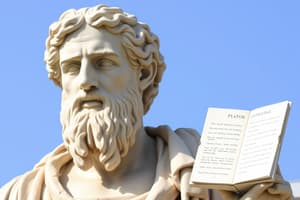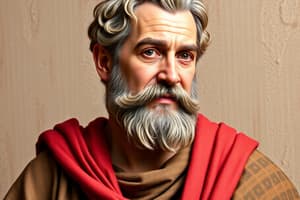Podcast
Questions and Answers
What does the term 'philosophy' originally mean in ancient Greek?
What does the term 'philosophy' originally mean in ancient Greek?
- Form of government
- Love of wisdom (correct)
- Political rule
- City-state
The concept of 'political' is associated with the individual citizen.
The concept of 'political' is associated with the individual citizen.
False (B)
Name one major philosopher mentioned in relation to Roman political philosophy.
Name one major philosopher mentioned in relation to Roman political philosophy.
Cicero
In ancient Greek, the word 'politeia' refers to the forms of __________.
In ancient Greek, the word 'politeia' refers to the forms of __________.
Match the following ancient philosophical movements with their descriptions:
Match the following ancient philosophical movements with their descriptions:
Which concept was central to the original Greek political philosophy?
Which concept was central to the original Greek political philosophy?
The Roman Republic was established after the rise of the Greek city-states.
The Roman Republic was established after the rise of the Greek city-states.
What was one key work of Cicero related to political philosophy?
What was one key work of Cicero related to political philosophy?
What does Plato propose for guardian-rulers in his ideal city?
What does Plato propose for guardian-rulers in his ideal city?
Aristotle supports the idea of abolishing private property for all citizens.
Aristotle supports the idea of abolishing private property for all citizens.
Who radicalized Plato's ideas by advocating the abolition of property for all citizens?
Who radicalized Plato's ideas by advocating the abolition of property for all citizens?
According to Plato, the rulers of the ideal city are supposed to be __________.
According to Plato, the rulers of the ideal city are supposed to be __________.
What is required for effective ruling, according to the Republic?
What is required for effective ruling, according to the Republic?
Match the following concepts with their descriptions:
Match the following concepts with their descriptions:
Plato believed that ruling well is a common skill that anyone can attain.
Plato believed that ruling well is a common skill that anyone can attain.
In the Republic, philosophers engage in rule out of __________.
In the Republic, philosophers engage in rule out of __________.
What distinguishes political expertise according to the Statesman?
What distinguishes political expertise according to the Statesman?
Political knowledge in the Republic is considered to have a special vocation for politics.
Political knowledge in the Republic is considered to have a special vocation for politics.
What knowledge is essential for a statesman according to the content?
What knowledge is essential for a statesman according to the content?
Plato's discussion in the Statesman is enriched by a story or myth about humans ruling other humans in place of living under ________ guidance.
Plato's discussion in the Statesman is enriched by a story or myth about humans ruling other humans in place of living under ________ guidance.
Match the political roles with their corresponding expertise according to the Statesman:
Match the political roles with their corresponding expertise according to the Statesman:
What aspect of rule does the Statesman raise questions about?
What aspect of rule does the Statesman raise questions about?
In the Statesman, political philosophy is only about political roles and does not connect to a broader philosophical understanding.
In the Statesman, political philosophy is only about political roles and does not connect to a broader philosophical understanding.
According to the Statesman, what role does a statesman play in relation to citizens?
According to the Statesman, what role does a statesman play in relation to citizens?
What power did the senators hold in the Roman political system?
What power did the senators hold in the Roman political system?
Cicero was known for his support of executing Roman citizens without trial.
Cicero was known for his support of executing Roman citizens without trial.
Who was the consul that asked the people for a resolution in the Augustan period?
Who was the consul that asked the people for a resolution in the Augustan period?
Cicero was considered a 'homo ______' as he came from a minor provincial family.
Cicero was considered a 'homo ______' as he came from a minor provincial family.
Match the following political concepts with their definitions:
Match the following political concepts with their definitions:
What issue did Cicero generally oppose?
What issue did Cicero generally oppose?
The Roman Senate was composed only of the wealthiest families in society.
The Roman Senate was composed only of the wealthiest families in society.
In which year did Cicero expose the Catiline conspiracy?
In which year did Cicero expose the Catiline conspiracy?
Which themes did Cicero emphasize in his writings?
Which themes did Cicero emphasize in his writings?
Cicero's De re publica discusses the ideal conditions for society only from a Stoic perspective.
Cicero's De re publica discusses the ideal conditions for society only from a Stoic perspective.
What is the title of Cicero's work that translates to 'On Duties'?
What is the title of Cicero's work that translates to 'On Duties'?
Cicero wrote the De re publica between the years _____ and _____ BCE.
Cicero wrote the De re publica between the years _____ and _____ BCE.
In the dialogue of De re publica, who are the main characters involved in the discussion?
In the dialogue of De re publica, who are the main characters involved in the discussion?
The 'Dream of Scipio' is part of the first three books of De re publica.
The 'Dream of Scipio' is part of the first three books of De re publica.
What significant political event is the backdrop for Cicero's De re publica?
What significant political event is the backdrop for Cicero's De re publica?
Match the following terms from Cicero's De re publica with their meanings:
Match the following terms from Cicero's De re publica with their meanings:
Flashcards are hidden until you start studying
Study Notes
Ancient Political Philosophy
- Ancient Greek political philosophy originated from the concept of the “πόλις" (polis), referring to the city-state.
- Plato's ideal city, as depicted in "Republic" and "Statesman", emphasized unity, with guardian-rulers lacking private property and families.
- The "Statesman" emphasizes the role of political expertise and distinguishes it from related disciplines like rhetoric, generalship, and judging.
- Plato's "Republic" and "Statesman" laid the foundation for integrating ethics and political philosophy.
Roman Political Philosophy
- The Romans developed their unique system of government incorporating both republican and imperial elements.
- Roman political thought was shaped by the influence of Greek philosophy, particularly Stoicism and Platonism.
- Cicero, a prominent figure in Roman political thought, wrote "De re publica" (On the Commonwealth) and "De legibus" (On the Laws), works that explored the best forms of government and political order.
- Cicero's "De officiis" (On Duties) offered insights into political ethics and influenced Western thought.
Studying That Suits You
Use AI to generate personalized quizzes and flashcards to suit your learning preferences.
![[POLSC 122 - R1] Ancient Political Philosophy Overview](https://images.unsplash.com/photo-1550776713-e562db9788d0?crop=entropy&cs=srgb&fm=jpg&ixid=M3w0MjA4MDF8MHwxfHNlYXJjaHwxNXx8UGxhdG8lMjBUaGUlMjBSZXB1YmxpYyUyMHBoaWxvc29waHklMjBjbGFzc2ljc3xlbnwxfDB8fHwxNzA5OTUzNTIzfDA&ixlib=rb-4.0.3&q=85&w=800&fit=crop&h=300&q=75&fm=webp)



